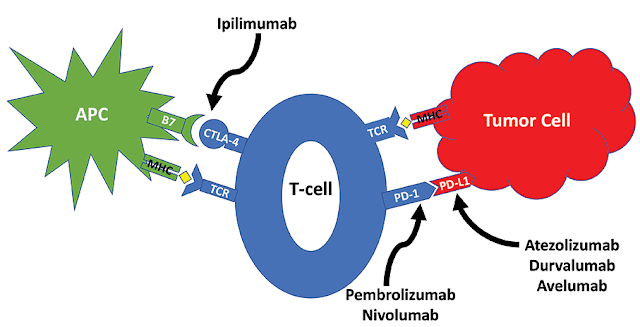Durvalumab uses:
Durvalumab
is a type of immunotherapy drug that is used to treat various types of cancer.
Immunotherapy is a kind of behavior that ties together the control of the
body's resistant system to brawl cancer. Durvalumab works by blocking the
interaction between PD-L1 (a protein found on cancer cells) and PD-1 (a protein
found on immune cells), thereby enabling the immune system to attack and
destroy cancer cells.
Durvalumab
is approved for use in the treatment of the following types of cancer:
- Non-Small Cell Lung Cancer (NSCLC) - Durvalumab has been shown to be effective in treating advanced NSCLC, particularly in combination with other chemotherapy drugs.
- Bladder Cancer - Durvalumab has been approved for the treatment of bladder cancer that has spread to other parts of the body and cannot be removed with surgery.
- Head and Neck Cancer - Durvalumab has been approved for the treatment of recurrent or metastatic head and neck squamous cell carcinoma (HNSCC).
- Urothelial Cancer - Durvalumab has been approved for the treatment of locally advanced or metastatic Urothelial carcinoma (UC) in patients who have been previously treated with chemotherapy.
Durvalumab
is typically administered through intravenous (IV) infusion. The recommended
dosage and duration of treatment vary depending on the specific patient's case
and the type of cancer being treated.
Common
side effects of Durvalumab include fatigue, skin rashes, fever, and low levels
of white blood cells. Patients should discuss the potential benefits and risks
of this treatment with their healthcare provider to determine if it is
appropriate for their individual case.
It is
important to note that Durvalumab is a relatively new treatment and ongoing
research is necessary to fully understand its long-term effects and benefits in
treating different types of cancer. Additionally, not all patients with cancer
will respond to Durvalumab, and it may not be suitable for everyone. A
patient's healthcare team will be able to provide more information and guidance
on the best treatment options for their specific case.
Durvalumab immunotherapy:
Durvalumab
is a type of immunotherapy drug that is used to treat various types of cancer.
Immunotherapy is a form of dealing that harnesses the influence of the body's protected
system to clash cancer. Durvalumab is a human monoclonal antibody that works by
blocking the interaction between PD-L1 (a protein found on cancer cells) and
PD-1 (a protein found on immune cells).
The
interaction between PD-L1 and PD-1 acts as a "brake" on the immune
system, preventing it from attacking cancer cells. By blocking this interaction,
Durvalumab allows the immune system to recognize and attack cancer cells,
leading to their destruction.
Durvalumab
has been approved for use in the treatment of non-small cell lung cancer
(NSCLC), bladder cancer, head and neck cancer, and Urothelial cancer. It is
typically administered through intravenous (IV) infusion.
Durvalumab
is one of several types of immunotherapy drugs that are currently available for
the treatment of cancer. Unlike traditional chemotherapy drugs, which work by
killing cancer cells directly, immunotherapy drugs work by enhancing the body's
own immune system to fight the cancer.
The side
effects of Durvalumab can vary, but common side effects include fatigue, skin
rashes, fever, and low levels of white blood cells. Patients should discuss the
potential benefits and risks of this treatment with their healthcare provider
to determine if it is appropriate for their individual case.
It is
important to note that Durvalumab is a relatively new treatment and ongoing
research is necessary to fully understand its long-term effects and benefits in
treating different types of cancer. Additionally, not all patients with cancer
will respond to Durvalumab, and it may not be suitable for everyone. A
patient's healthcare team will be able to provide more information and guidance
on the best treatment options for their specific case.







0 Comments